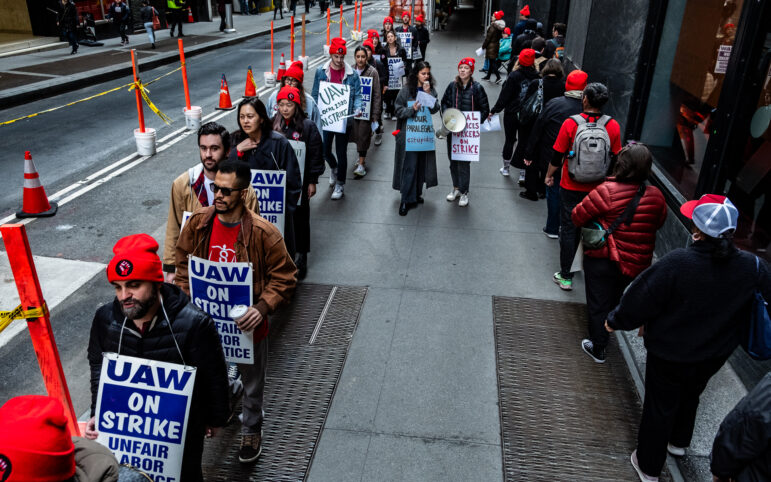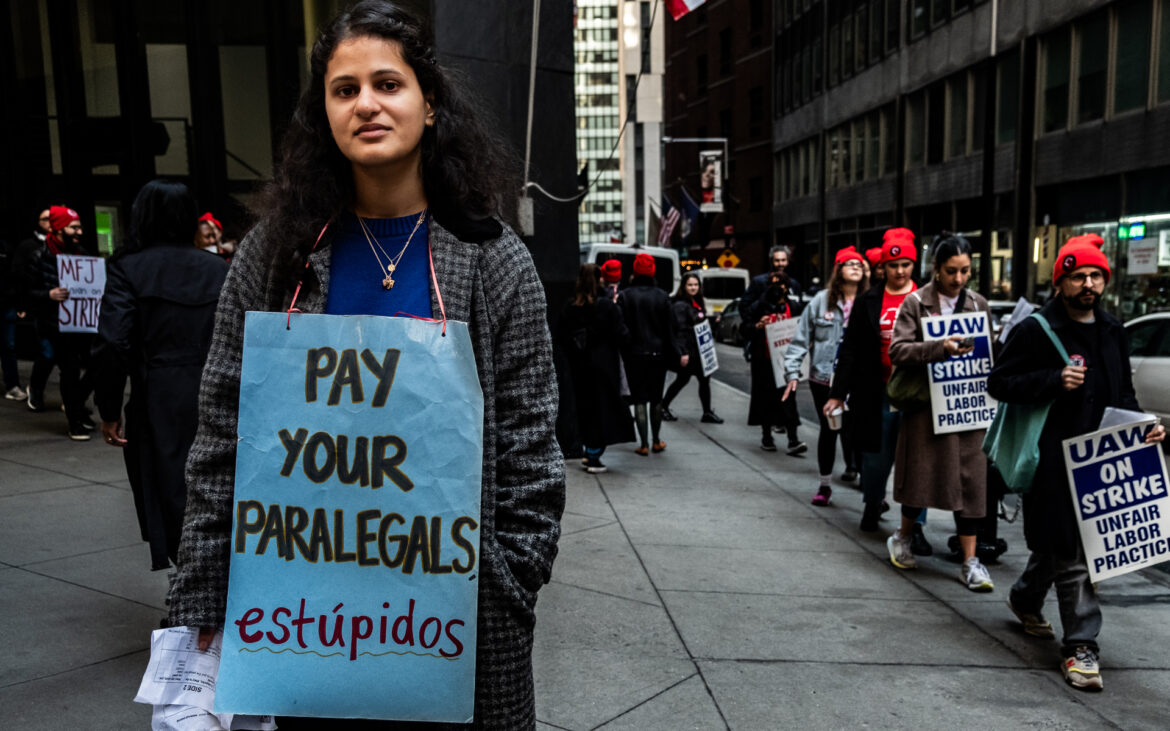Mobilization for Justice has been operating for more than 12 weeks without the workers who typically execute its mission to combat economic injustice—its more than 100 unionized staff.

Adi Talwar
Unionized employees of Mobilization for Justice, Inc. (MFJ) picketing outside MFJ’s Manhattan office on Feb. 27th, 2024.For more than 12 weeks running, the legal services provider Mobilization for Justice (MFJ) has been operating without the workers who typically execute its mission to combat economic injustice—its more than 100 unionized staff.
Now, New York City Comptroller Brad Lander is probing the impact of this short-handedness. Specifically in city housing courts, where, prior to February’s strike announcement, over 40 staff attorneys helped tenants fight eviction and sue their landlords to win building repairs.
MFJ workers deserve a fair contract, Lander said in a statement, as they are “on the front lines to protect people from losing the roof over their heads” yet “also struggle to make ends meet.”
In a letter sent Wednesday to Department of Social Services (DSS) Commissioner Molly Park, Lander requested reports for February through May detailing eviction casework that MFJ has performed during the strike under city contracts. Non-union supervisors and directors are currently handling tenant representation, the organization confirmed.
DSS administers the city’s novel Right to Counsel program through its Office of Civil Justice (OCJ). Passed into law in 2017, Right to Counsel is intended to provide low-income tenants with free lawyers from organizations including MFJ.
The effort has been hailed a success—last fiscal year, 84 percent of represented tenants were able to stay in their homes—but it has yet to be funded to meet demand, despite a $20 million increase baselined in last year’s budget.
Lander’s office tracks the city’s representation rate for eviction cases, which hit a low of 24 percent for cases filed in December, and has since rebounded to 53 percent for February cases. (The tool does not filter for income eligibility.)
“We would like to better understand the impact that MFJ management’s failure to reach a resolution with their employees has had on the city’s ability to implement one of its cornerstone programs to prevent eviction and homelessness,” Lander’s letter states.
It goes on to request anonymized reports including the number of new eviction cases opened each day; the outcomes of each court appearance; breakdowns of service outcomes like rental assistance and negotiated buyouts; and all attorney activities, including trials, hearings, motions and appeals.
Reached by email prior to the letter’s release, MFJ Chief Development Officer Eric Alterman told City Limits that the organization would not comment on issues related to a potential investigation. “Brad Lander’s office has not reached out to MFJ regarding an investigation, though our counsel has inquired to no avail,” he wrote.
MFJ workers, including attorneys, paralegals and support staff, are members of the Legal Services Staff Association (LSSA) Local 2320, part of the United Auto Workers. They went on strike in mid-February, after rejecting a contract offer they said fell short of their needs, including fair pay and remote work flexibility.
In addition to housing, members specialize in foreclosure, bankruptcy, immigration, government benefits and disability rights.
One of the union’s primary demands is a $60,000 salary floor for non-attorneys. Support staff salaries under the last contract started at about $51,000, while paralegals started around $53,000.
MFJ has now agreed to meet this demand, Alterman told City Limits by email. The latest offer also includes a larger cost-of-living adjustment (COLA): at least 4 percent in the first year, 2 percent in the second year and 3 percent in the third year, up from 2 percent annually in the offer that set off the strike.
“The $60,000, finally engaging with us on that is very welcome,” said Brenden Ross, a member of the union’s bargaining team and senior staff attorney with MFJ’s Mental Health Law Project. “We’re at a place where I think we can say we’re hopeful we’re moving toward each other.”
But the bargaining team is not yet satisfied with the COLA, pointing to Mayor Eric Adams’ March announcement of a roughly 9 percent cost-of-living boost for human services workers. “To see them not even hitting 3 in that second year, it feels like it’s not reorienting to developments in funding,” Ross said.
Another major sticking point is the union’s demand that MFJ rehire a temporary worker who they say was terminated after filing a labor grievance seeking permanent employee status. Alterman called this a mischaracterization, saying MFJ asked the staffing agency to “reassign the individual to a different job” in light of the grievance.
“Our members feel strongly about rehiring to fight back against retaliation,” said Ella Abeo, a bargaining committee member and housing paralegal in the Bronx. “Reinstating their job would bring the union and management close enough to end the strike.”
Meanwhile, MFJ attorneys have been visiting housing courts in Manhattan and the Bronx to observe how their managers and supervisors are getting by in their absence.
“It’s important for the other stakeholders in this to be reminded—such as judges, clients, opposing counsel—that we’re not picketing a few times a week and that’s that,” said staff attorney Payton Fisher, who has helped organize the effort.
Sean Davis is a staff attorney with the Mental Health Law Project, and has made a handful of visits to Manhattan Housing Court during the strike. He told City Limits Tuesday that he has observed numerous case adjournments.

Adi Talwar
Tara Joy, housing intake specialist at Mobilization for Justice, picketing with her colleagues outside MFJ’s Manhattan office in February.“I can say with certainty that our clients are not receiving the same level of representation as they were,” he said. “What I’ve seen is a lot of adjournments. Sometimes that’s strategic, sometimes that’s a good thing for our clients, but in this case it seems to be a tactic to buy time.”
Courts only offer so many adjournments before a case must be settled or go to trial, Davis continued. “I anticipate unionized staff coming back to cases that look substantively different, deviating from strategy,” he said.
Alterman of MFJ pushed back on the inadequate representation claims, calling them false. Managers are meeting daily with clients, he said, filing motions and going to trial. MFJ has 12 housing-focused supervisors, he added, who have resolved over 150 cases during the strike, and made over 100 appearances monthly.
“MFJ supervisors and directors—the experienced housing attorneys who supervise union staff, who they learn from every day—are continuing to provide our clients with the highest level of representation and expertise, despite incredibly high caseloads,” Alterman wrote.
In a statement to City Limits prior to Lander’s data request, a DSS spokesperson said the city’s mandate to provide legal services supersedes the contractual obligations of any given contractor.
“We are aware of the issues our provider-partner MFJ is facing which impact their entire scope of services, including the city’s Right to Counsel program, and we’re responding with urgency to address any immediate impact by diverting relevant cases to other providers,” the statement read.
But the union has criticized these diversion efforts, accusing the Human Resources Administration (HRA), part of DSS, of helping the organization perform work despite the strike, and has urged the City Council to withhold funding from MFJ as long as the strike continues. MFJ received $6.8 million for its Right to Counsel efforts in the year ending June 30, according to DSS.
“Please inform MFJ that the Council will not fund the organization while this strike continues, and specifically as MFJ’s management needlessly prolongs it,” said staff attorney Lisa Meehan at a recent city budget hearing. “We’re concerned that continuing to fund MFJ while the strike goes on may lead to many people continuing to receive inadequate representation.”
Bronx Councilmember Carmen De La Rosa, who chairs the Committee on Civil Service and Labor, supports the demand, her office confirmed Tuesday.
“New York’s cost of living is increasing—a fact MFJ knows well through their clientele’s stories,” De La Rosa said in a written statement. “MFJ must commit to bargaining in good faith and meet the basic demands of their workers. We continue to show solidarity with those on strike until a fair contract is presented.”
As the strike continues, it is already superlative in length. On April 30, the union announced that they are now in the city’s longest legal services strike since a 15-week Legal Services for New York walk-out settled in 1991.
It will go on until management presents the union with a strong enough offer to discourage burnout and attrition, according to Davis. “We are doing this for our clients,” he said. The next bargaining session is scheduled for Thursday.
Comptroller Lander to DSS Commissioner Park, 5.14.2024 by City Limits (New York) on Scribd
To reach the reporter behind this story, contact Emma@citylimits.org. To reach the editor, contact Jeanmarie@citylimits.org
Want to republish this story? Find City Limits’ reprint policy here.








